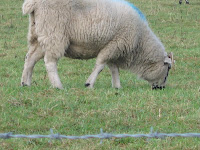The Cottage we've moved into is called . . . wait for it . . .
The Cottage - as are two other cottages within the same postcode and a few more in the wider village. The post person told me wearily that this was common -there are lots of cottages just called The Cottage, as well as plenty of barns called The Barn and the only way she/he can work out what belongs to who is by learning everybody's name. Which is nice. It took a week or two but now the GPO knows who we are which means that, as well as cards and letters we now also receive our rightful daily bin load of bills, adverts, free papers etc.
However, getting other deliveries is proving far more challenging - and Christmas by internet has only made it worse. The people from Citylink, ParcelForce, DPD etc neither know nor care what our names are as long as they get rid. It's all been very exciting - one parcel was delivered to a coal bunker from where I skulkingly retrieved it - the neighbours probably think we're coal thieves - (what else can you expect from Manchester people?)
I've also managed to intercept a few deliveries by lurking about on the lane and flagging down men in vans. Could be misinterpreted. But today it's all gone wrong and my Amazon package has been posted through one of the other
The Cottage's letter boxes - the one that's a holiday cottage. I can see it lying in their porch in full view: desirable and unobtainable. Hope they visit soon.
The thing is - it's a tad frustrating but it's also puzzling: this has been going on for years and years - why didn't the previous owner or one of the other owners simply change the name to something, well, different? Answers on a postcard please. Perhaps in the olden days it was considered a bit fancy to give cottages names, after all everybody knew who lived where. This still works - neighbours, when describing where somebody else lives, often don't give the house name but the location - e.g.
they live in the house on the corner next to the one with the red door. It's still a little bit eighteenth century here
. Except
for all the delivery vans buzzing about, of course.And the internet that brought them here.
We do plan to change the name as soon as possible but we haven't thought of one yet. Joke suggestions so far from people who call themselves friends have been:
Sixty Percent (because the balance between moving here and staying in Manchester was 60/40) - don't think that would go down well in the village, and it doesn't have much of a ring;
Dunrunnin' was another - which doesn't deserve comment.
Ideas welcome - the winner gets a free lunch. If they can find us.
*
Rayburn demands recount!
In the last post, I said that, frighteningly, we had already used one whole tankful of oil and the Rayburn was to blame. I was wrong. Technically it wasn't me who was wrong but as I don't want to embarrass him I won't name names except to say that his name begins with R. The gauge wasn't working - you're supposed to check it with a stick said the oilman (back to the eighteenth century) . . . and it turned out to be only a quarter empty. Phew! Sorry Rayburn. Still getting rid of you though. You may make nice soups and cakes and perfect oven chips but you are going.
Definitely. Don't try and get round me.
(Cottage photos taken with telephoto lens by mancinbrassington, paparazzi)



























